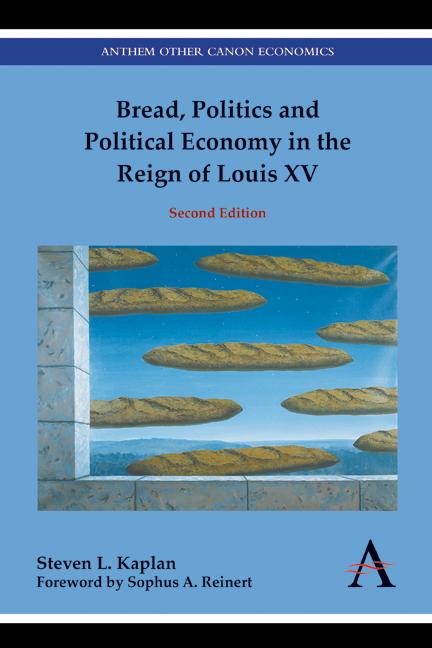62 results
Calibration database for the Murchison Widefield Array All-Sky Virtual Observatory
- Part of
-
- Journal:
- Publications of the Astronomical Society of Australia / Volume 37 / 2020
- Published online by Cambridge University Press:
- 11 June 2020, e021
-
- Article
-
- You have access
- HTML
- Export citation
Chapter Fifteen - The Grain Question as the Social Question: Necker's Antiphysiocracy
-
-
- Book:
- The Economic Turn
- Published by:
- Anthem Press
- Published online:
- 12 February 2019
- Print publication:
- 16 January 2019, pp 505-584
-
- Chapter
- Export citation
Chapter Nine - Galiani: Grain and Governance
-
-
- Book:
- The Economic Turn
- Published by:
- Anthem Press
- Published online:
- 12 February 2019
- Print publication:
- 16 January 2019, pp 221-304
-
- Chapter
- Export citation
Chapter Eleven - “Is the Feeling of Humanity not More Sacred than The Right of Property?”: Diderot's Antiphysiocracy in His Apology of Abbé Galiani
-
-
- Book:
- The Economic Turn
- Published by:
- Anthem Press
- Published online:
- 12 February 2019
- Print publication:
- 16 January 2019, pp 351-394
-
- Chapter
- Export citation
Chapter Twenty-Two - Epilogue: Political Economy and the Social
-
-
- Book:
- The Economic Turn
- Published by:
- Anthem Press
- Published online:
- 12 February 2019
- Print publication:
- 16 January 2019, pp 735-748
-
- Chapter
- Export citation
Chapter Ten - “Live and Die Proprietors and Free”: Morellet Dismantles the Dialogues and Defends the Radical Liberal Break
-
-
- Book:
- The Economic Turn
- Published by:
- Anthem Press
- Published online:
- 12 February 2019
- Print publication:
- 16 January 2019, pp 305-350
-
- Chapter
- Export citation
Chapter One - The Economic Turn in Enlightenment Europe
-
-
- Book:
- The Economic Turn
- Published by:
- Anthem Press
- Published online:
- 12 February 2019
- Print publication:
- 16 January 2019, pp 1-34
-
- Chapter
- Export citation
Les apprentissages parisiens aux xviiie et xixe siècles
-
- Journal:
- Annales. Histoire, Sciences Sociales / Volume 73 / Issue 4 / December 2018
- Published online by Cambridge University Press:
- 11 March 2020, pp. 849-889
- Print publication:
- December 2018
-
- Article
- Export citation
The Phase II Murchison Widefield Array: Design overview
-
- Journal:
- Publications of the Astronomical Society of Australia / Volume 35 / 2018
- Published online by Cambridge University Press:
- 23 November 2018, e033
-
- Article
-
- You have access
- HTML
- Export citation
The Engineering Development Array: A Low Frequency Radio Telescope Utilising SKA Precursor Technology
-
- Journal:
- Publications of the Astronomical Society of Australia / Volume 34 / 2017
- Published online by Cambridge University Press:
- 17 August 2017, e034
-
- Article
-
- You have access
- HTML
- Export citation
Conclusion
-
- Book:
- Bread, Politics and Political Economy in the Reign of Louis XV
- Published by:
- Anthem Press
- Published online:
- 05 December 2015
- Print publication:
- 15 September 2015, pp 677-702
-
- Chapter
- Export citation
Chapter IX - The Government, the Parlements, and the Battle over Liberty: I
-
- Book:
- Bread, Politics and Political Economy in the Reign of Louis XV
- Published by:
- Anthem Press
- Published online:
- 05 December 2015
- Print publication:
- 15 September 2015, pp 408-450
-
- Chapter
- Export citation
Frontmatter
-
- Book:
- Bread, Politics and Political Economy in the Reign of Louis XV
- Published by:
- Anthem Press
- Published online:
- 05 December 2015
- Print publication:
- 15 September 2015, pp i-iv
-
- Chapter
- Export citation
Chapter XI - From Political Economy to Police: The Return to Apprehensive Paternalism
-
- Book:
- Bread, Politics and Political Economy in the Reign of Louis XV
- Published by:
- Anthem Press
- Published online:
- 05 December 2015
- Print publication:
- 15 September 2015, pp 491-554
-
- Chapter
- Export citation
Index
-
- Book:
- Bread, Politics and Political Economy in the Reign of Louis XV
- Published by:
- Anthem Press
- Published online:
- 05 December 2015
- Print publication:
- 15 September 2015, pp 751-771
-
- Chapter
- Export citation
Chapter V - Forcing Grain to Be Free: The Government Holds the Line
-
- Book:
- Bread, Politics and Political Economy in the Reign of Louis XV
- Published by:
- Anthem Press
- Published online:
- 05 December 2015
- Print publication:
- 15 September 2015, pp 215-251
-
- Chapter
- Export citation

Bread, Politics and Political Economy in the Reign of Louis XV
-
- Published by:
- Anthem Press
- Published online:
- 05 December 2015
- Print publication:
- 15 September 2015
-
- Book
- Export citation
List of Illustrations
-
- Book:
- Bread, Politics and Political Economy in the Reign of Louis XV
- Published by:
- Anthem Press
- Published online:
- 05 December 2015
- Print publication:
- 15 September 2015, pp vii-viii
-
- Chapter
- Export citation
Bibliography
-
- Book:
- Bread, Politics and Political Economy in the Reign of Louis XV
- Published by:
- Anthem Press
- Published online:
- 05 December 2015
- Print publication:
- 15 September 2015, pp 703-750
-
- Chapter
- Export citation
List of Abbreviations
-
- Book:
- Bread, Politics and Political Economy in the Reign of Louis XV
- Published by:
- Anthem Press
- Published online:
- 05 December 2015
- Print publication:
- 15 September 2015, pp xvii-xviii
-
- Chapter
- Export citation



